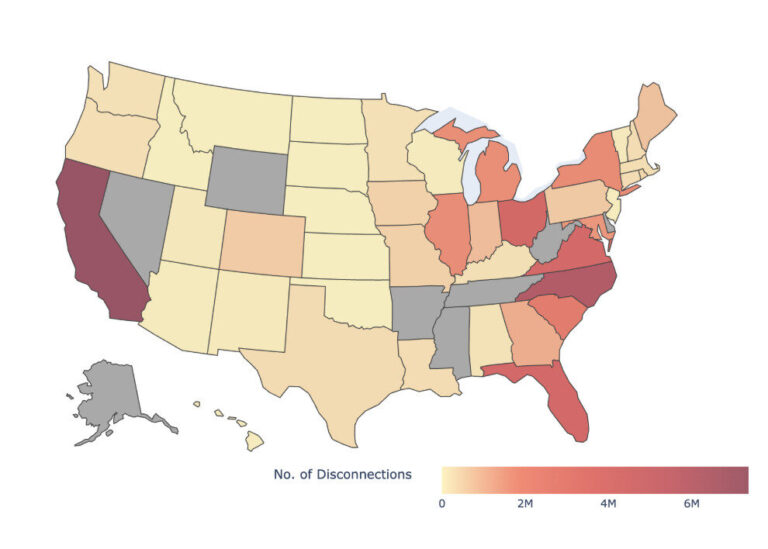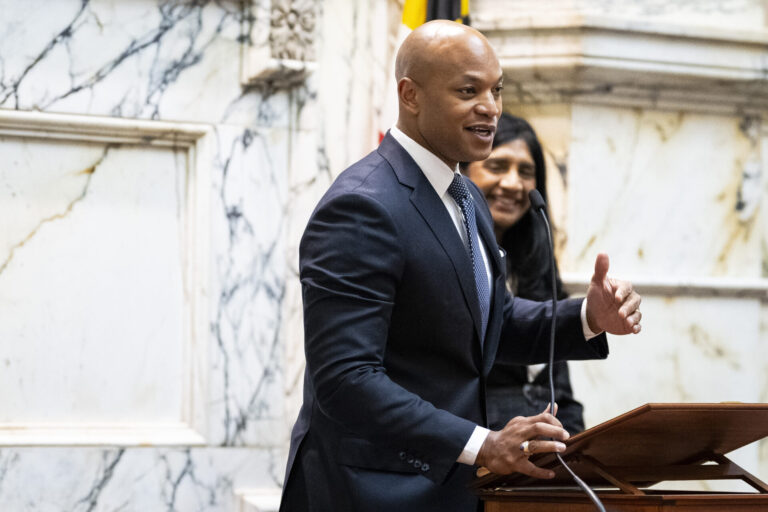Final Campaign Finance Reports Filed Before Election Shows APS Spending $30 Million To Defeat Prop 127
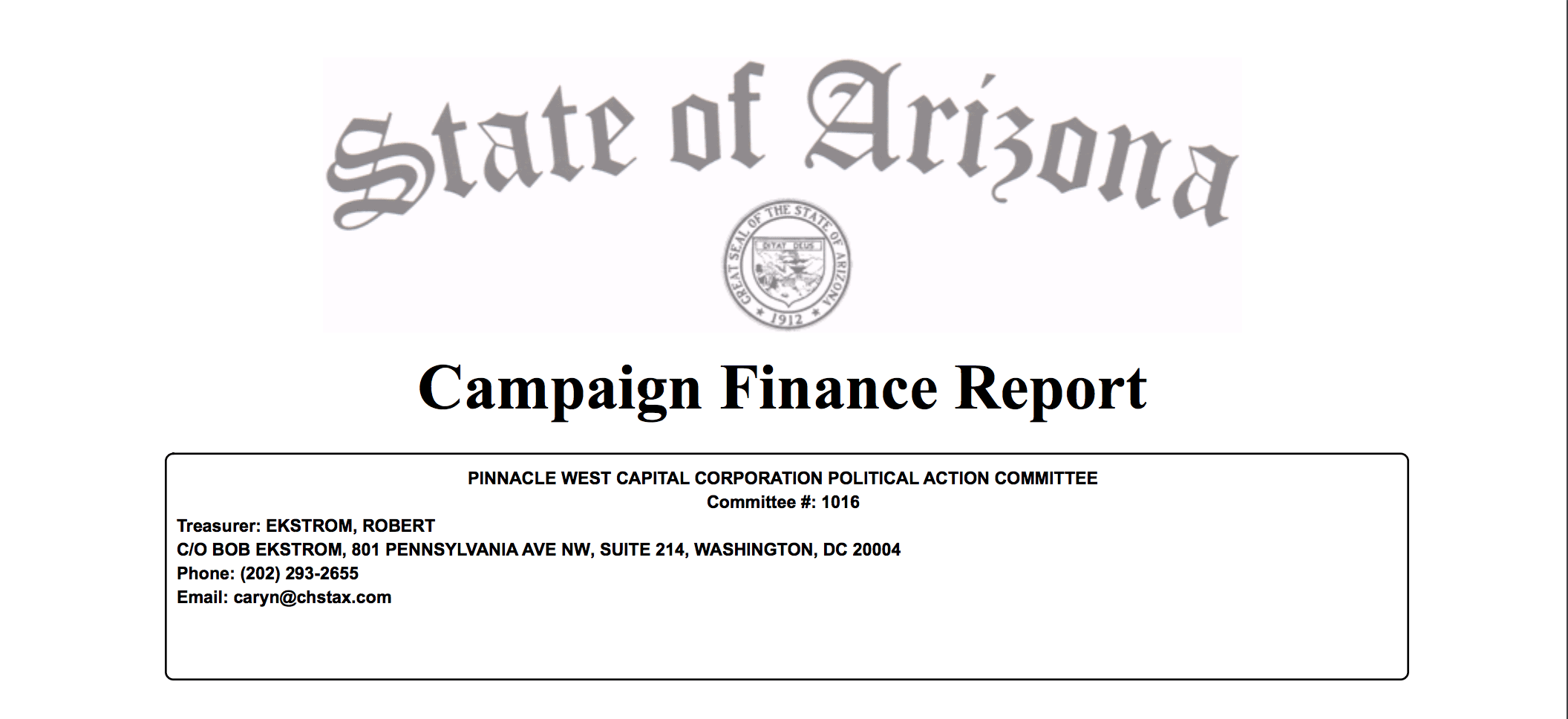
Pinnacle West Capital Corporation, the parent company of monopoly utility Arizona Public Service, spent another $8 million from October 1 through October 20 to fight Prop 127, the renewable energy ballot initiative.
The new contributions bring the total that Pinnacle West has contributed to Arizonans for Affordable Electricity, the political action committee (PAC) that the utility created to fight the initiative, to $30,279,754. That spending represents 6.2% of the $488 million in profits that Pinnacle West earned in 2017. Prop 127 would require APS to source 50% of its electricity from renewable sources by 2030. The current requirement is 15% by 2025.
The $30.2 million surpasses previous monopoly utility spending to fight renewable energy ballot initiatives in recent years. In 2012, Michigan utilities DTE Energy and Consumers Energy spent a combined $20.8 million to successfully prevent a 25% by 2025 standard. Pinnacle West’s $30.2 million of spending to date also tops the combined $20.1 million that Florida utilities spent in their unsuccessful attempt restrict rooftop solar two years ago; Florida Power & Light led the way that year with over $8 million in contributions.
Arizonans for Affordable Electricity’s $30,000 To Help Democratic Rep. Cesar Chavez
The latest filing also reveals that the APS-funded ballot PAC spent $28,092.26 on mailings to support the Cesar Chavez for Arizona campaign. That’s in addition to the $3,000 the legislator has received from the Pinnacle West PAC this election cycle. Chavez hasn’t filed his 3rd quarter finance report (August 12 through September 30) nor his pre-general report (October 1 through October 20), and it appears he owes several hundred dollars in late fees for failing to disclose those reports and others on time.

The recent contributions to Chavez from APS have instead appeared in the Arizonans for Affordable Electricity’s report and the Pinnacle West PAC filing.
Chavez, who is a freshman legislator, had only received $500 from the utility in his previous campaign. Earlier this year, Chavez and Sen. Robert Meza co-authored an op-ed against the ballot initiative. Chavez also was part of a network of APS-funded politicians and organizations that submitted arguments against the Clean Energy Healthy Arizona ballot for the Secretary of State to include in its publicity pamphlet that includes information about the statewide initiatives.
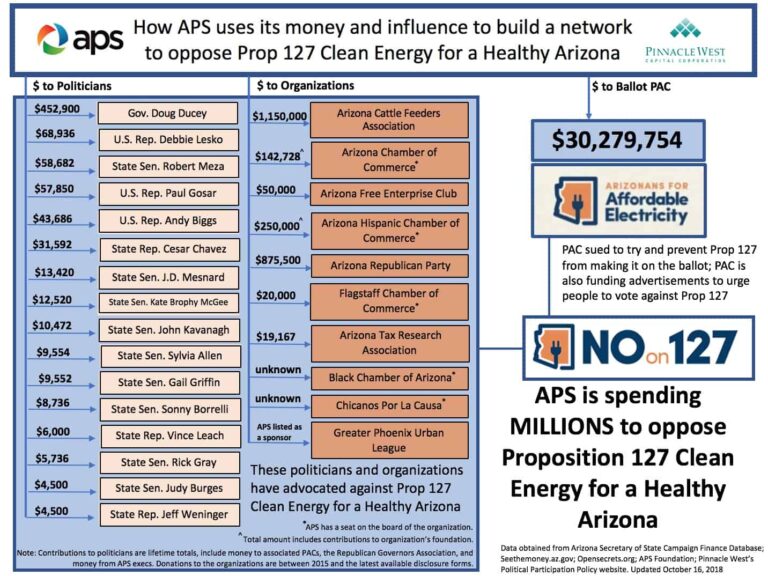
Chavez joins Meza and Rep. Mark Cardenas as the only elected Democrats in Arizona who have spoken out against Prop 127. All have received significant funding from APS.
Arizonans for Affordable Electricity Tweeted on September 11 that Cardenas, who is not running for reelection, “has joined Team #NoOn127.” Two weeks later, Cardenas personally received $8,000 in “consulting fees” from the Pinnacle West-funded ballot PAC.
Pinnacle West also contributed $50,000 over the summer to a PAC set up to help Meza, who was termed out of his Senate seat, to win a competitive primary for a House district.
According to the Phoenix New Times,
“Friends of Robert Meza registered as a political action committee on July 8, 2018. On July 25, cash began flying, campaign finance records show. That day, the Arizona Chamber of Commerce donated $5,000, and the PAC spent $6,000 on signs, flyers, door hangers, handouts, and canvassers.
The next day, July 26, Pinnacle West donated $50,000, and the PAC spent $21,740 on more flyers, handouts, door hangers and canvassers. On July 27, the PAC bought $20,452 of direct mailers and spent $4,160 on website services.”
Meza went on to win in his primary but has since received criticism from his Democratic colleagues. Rep. Ken Clark told the Arizona Republic, “I think it’s an anathema to what the Democratic party should be supporting. I think the Democratic party should be supporting renewable energy and a more aggressive approach to dealing with climate change.”
Sen. Juan Mendez said, “For him to just turn around and endorse (APS’) side of the initiative and everything that they are doing, and to take money from them, it seems he is more interested in representing their views than ours. It makes it way harder to look at as anything but a pay for play in politics.”
Meza has also received thousands of dollars of personal income throughout his career from non-profit groups who raise money from APS.
U.S. Rep. Raul Grijalva Refunds APS’ Contributions
The most recent filings also reveal that U.S. Rep. Raul Grijalva returned $6,000 that Pinnacle West’s PAC contributed to him through multiple checks dating from February-September 2018. When asked about the motivations behind returning money from APS’ parent company, Rep. Grijalva told the Energy and Policy Institute:
I returned the donation because Arizona Public Services spent over $11 million to keep Proposition 127 off the ballot. It’s one thing to oppose a clean energy ballot initiative, but it’s another thing to try to take away the right of Arizona’s voters to decide what’s best for their community. This is not reflective of the values of my campaign.”
Chispa Arizona, a program of the League of Conservation Voters, has asked candidates to take a pledge to reject contributions from monopoly utilities. “Refusing to accept utility money serves as a clear sign to voters that the people’s interests come first,” its executive director Laura Dent wrote.
The Pinnacle West PAC also donated $5,000 to Florida Governor Rick Scott’s campaign for the U.S. Senate, $1,000 to Ted Cruz’s reelection campaign, and $1,000 to Illinois Rep. Peter Roskam this period, among others. Roskam helped to write the Tax Cuts and Jobs Act, which Trump signed into law last year.
Pinnacle West leads the industry in terms of campaign contributions to federal candidates and their PACs thus far during this election cycle.
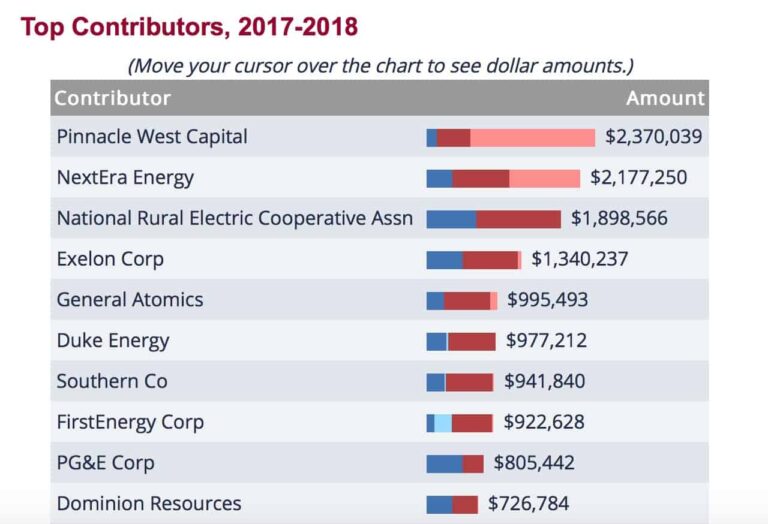
APS’ Arizonans for Sustainable Energy Policy Still Has Not Spent On ACC Races
Arizonans for Sustainable Energy Policy, another PAC set up and funded by APS to the tune of $3.2 million, has only spent $613,831 to date. $300,000 of that amount went to the AZ GOP on September 28, while the rest has been spent on operating expenses, including $65,000 to Veridus LLC, the public relations firm running the Pinnacle West-funded PACs.
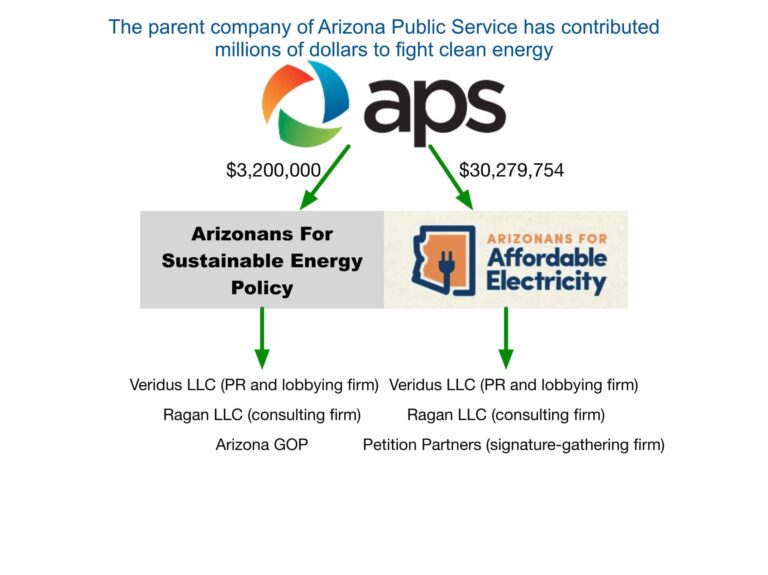 The PAC was created last year to make independent expenditures on behalf of candidates, according to its spokesperson Matt Benson, and as a potential vehicle for the utility to influence the ACC race. If the APS-funded PAC does spend in the final week to influence the ACC race, voters may not learn about it until after the election, since the next campaign finance report won’t be available until the first few weeks in January 2019.
The PAC was created last year to make independent expenditures on behalf of candidates, according to its spokesperson Matt Benson, and as a potential vehicle for the utility to influence the ACC race. If the APS-funded PAC does spend in the final week to influence the ACC race, voters may not learn about it until after the election, since the next campaign finance report won’t be available until the first few weeks in January 2019.
Dark money groups spent more than $3 million on independent expenditures in 2014 to help current ACC commissioner Tom Forese and former commissioner Doug Little get elected; APS has never confirmed nor denied being the source of that money.
APS did spend openly on the ACC races in 2016 by giving $4 million to a PAC which made independent expenditures to benefit current commissioners Bob Burns, Andy Tobin, and Dunn, further fueling accusations from customers that the ACC could not be trusted to regulate in the public interest. The similar venture which APS set up in 2016, “Arizona Coalition for Reliable Energy,” waited until October 24 to spend over $4 million on the ACC races in that year.


